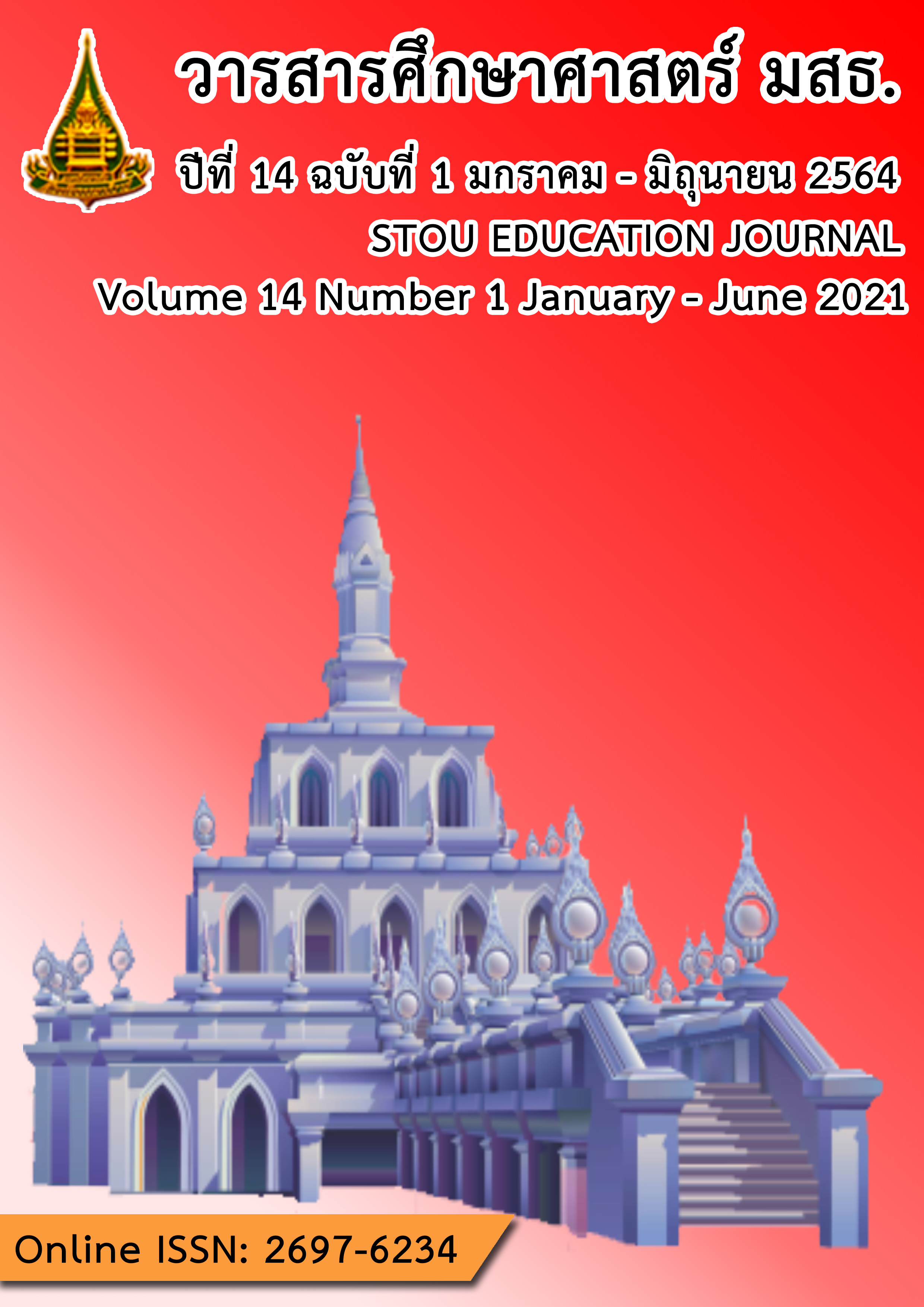Learning Management via Professional Learning Community (PLC) in Phuket Rajabhat University Demonstration School, Primary Section
Main Article Content
Abstract
The purposes of this research were to (1) study the process of learning management via Professional Learning Community (PLC), (2) study the effects of learning management via PLC, and (3) study problems and obstacles of learning management via PLC in Phuket Rajabhat University Demonstration School, Primary Section. The target groups included 24 students who were representatives of low learning achievement student groups (from 3 community), 28 teachers, 2 school administrators and 5 lecturers from the University. The employed research tools were a participatory observation form, and an in-depth interview form. The research data was analyzed with content analysis. The research results were as follows: (1) the process of learning management via PLC consisted of the planning step (Plan), the practice step (Do), and the outcome reflection step (See); (2) the effects of learning management via PLC were as follows: the teachers gained more knowledge and understanding of the context of the courses they were teaching; they had learned and shared experiences with their colleagues; they were more confident to express ideas; they were interested in new teaching techniques; they had performed their work with more enthusiasm; they were committed to the mission of the organization; and they happily worked together in teams; the students, on the other hand, gained more knowledge and understanding of the contents they had learned; they had thought, spoken, and practiced; they had participated in learning activities; and they had been more interested, enthusiastic, and enjoyable in their learning; and (3) the problems and obstacles of learning management via PLC were the following: the lack of technological equipment in the classroom for making learning more interesting; the lack of budget for purchasing materials for production of instructional media; the school administrators having limited time in monitoring, follow up and supervise the work performance including participation in observation of teaching, and reflection of what had been learned resulting in the learning management via PLC being not continuous and less efficient.
Article Details
References
ฉัตรชัย หวังมีจง และองอาจ นัยพัฒน์. (2560). สมรรถนะของครูไทยในศตวรรษที่ 21: ปรับการเรียนเปลี่ยน
สมรรถนะ. กรุงเทพฯ: สถาบันเสริมศึกษาและทรัพยากรมนุษย์ มหาวิทยาลัยธรรมศาสตร์.
ชูชาติ พ่วงสมจิตร์. (2558). ชุมชนการเรียนรู้ทางวิชาชีพ. ใน เอกสารประกอบการบรรยายการสร้างชุมชนการเรียนรู้ทางวิชาชีพ. พังงา: วิทยาลัยชุมชนพังงา.
พรรณทิภาภรณ์ อภิปริญญา. (2558). สภาพและปัญหาของการสร้างชุมชนการเรียนรู้ทางวิชาชีพของโรงเรียนในสำนักงานเขตพื้นที่การศึกษามัธยมศึกษา เขต 1 และเขต 2 กรุงเทพมหานคร. (วิทยานิพนธ์ครุศาสตรมหาบัณฑิต ไม่ได้ตีพิมพ์). จุฬาลงกรณ์มหาวิทยาลัย, กรุงเทพฯ.
พิมพันธ์ เดชะคุปต์ และพเยาว์ ยินดีสุข. (2557). การจัดการเรียนรู้ในศตวรรษที่ 21 (พิมพ์ครั้งที่ 4). กรุงเทพฯ: โรงพิมพ์แห่งจุฬาลงกรณ์มหาวิทยาลัย.
มนตรี แย้มกสิกร. (2559). ชุมชนการเรียนรู้วิชาชีพ: ความท้าทายต่อการเปลี่ยนตนเองของครู. ใน การประชุมทางวิชาการของคุรุสภา ประจำปี 2559 เรื่อง การวิจัยนวัตกรรมการเรียนรู้และการจัดการศึกษาเพื่อการพัฒนาที่ยั่งยืน. กรุงเทพฯ: สำนักงานเลขาธิการคุรุสภา.
โรงเรียนสาธิตมหาวิทยาลัยราชภัฏภูเก็ต. (2562). รายงานคุณภาพการศึกษาประจำปีการศึกษา 2562. ภูเก็ต: มหาวิทยาลัยราชภัฏภูเก็ต.
วรลักษณ์ ชูกำเนิด, เอกรินทร์ สังข์ทอง, และชวลิต เกิดทิพย์. (2557). รูปแบบชุมชนการเรียนรู้ทางวิชาชีพครูสู่การเรียนรู้ในศตวรรษที่ 21 บริบทโรงเรียนในประเทศไทย. วารสารหาดใหญ่ วิชาการฯ, 12(2) , 123-134.
วิจารณ์ พานิช. (2555). วิถีสร้างการเรียนรู้เพื่อศิษย์ในศตวรรษที่ 21. กรุงเทพฯ: ตถาตาพลับลิเคชั่น.
สถาพร พฤฑฒิกุล. (2558). คุณภาพผู้เรียนเกิดจากกระบวนการเรียนรู้. ใน เอกสารประกอบการฝึกอบรม. สระแก้ว: คณะเทคโนโลยีการเกษตร มหาวิทยาลัยบูรพา วิทยาเขตสระแก้ว.
สุภางค์ จันทวานิช. (2559). การวิเคราะห์ข้อมูลในการวิจัยเชิงคุณภาพ (พิมพ์ครั้งที่ 12). กรุงเทพฯ: สำนักพิมพ์จุฬาลงกรณ์มหาวิทยาลัย.
สุรพล ธรรมร่มดี, ทัศนีย์ จันอินทร์, และคงฤช ไตรยวงค์. (2553). อาศรมศิลป์วิจัย การวิจัยและพัฒนาชุมชนแห่งการเรียนรู้แนวจิตตปัญญา. โครงการเอกสารวิชาการการเรียนรู้สู่การเปลี่ยนแปลง. ลำดับที่ 8. นครปฐม: เอมี่ เอ็นเตอร์ไพรส์.
Dufour, R. (2007). Professional learning community: A bandwagon, an idea worth considering, or our best hope for high levels of learning?. Middle School Journal, 39(1), 4-8
Hord, S.M. (1997). Professional learning communities: Communities of inquiry and improvement. Austin: Southwest Educational Development Laboratory.


